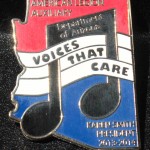A Personal Lesson In Promise
 The following is a portion of a speech I gave last Saturday at the local kick off for the National Veterans Creative Arts Competition. I was asked to speak, to those interested in entering and the local auxiliary who sponsors entrants, on my passion for music and give them some words of advice. The word inspiration was mentioned. I did my humble best.
The following is a portion of a speech I gave last Saturday at the local kick off for the National Veterans Creative Arts Competition. I was asked to speak, to those interested in entering and the local auxiliary who sponsors entrants, on my passion for music and give them some words of advice. The word inspiration was mentioned. I did my humble best.
When I was in High School, I participated in every musical activity I could get my hands on. I studied piano and took organ lessons. I sang in and accompanied for choirs and musicals. I learned clarinet so I could be in Marching Band and Orchestra. I played at church.
When I was a junior or senior, our school choir began singing all around the San Francisco Bay Area. We performed for several Citizenship Ceremonies, at community celebrations, at what were then referred to as nursing homes, and then, one night, at Oak Knoll Naval Hospital.
This was near the end of the war in Vietnam. We had all seen the footage of battle on the nightly news and our teachers did their best to prepare us, but we were mostly young and innocent. We were naive. We knew that violent world was there but mostly we managed to keep it in a bubble.
Oak Knoll was a collection of white buildings in a really beautiful landscape. I remember climbing stairs to get to the auditorium. Boys our own age in wheelchairs and stretchers filled the room. Some had no legs, some had no arms, some were scarred, some were bandaged so that only their eyes could be seen. During the program, as I looked out some were smiling, some were crying, some tapped along, a few sang.
After the program, there was a social hour. The young men talked sports and joked with the tenors and basses and flirted with the sopranos and altos. It was totally normal and totally surreal at the same time.
It was full dark as we found our way back down the stairs. We were all quiet, in awe of the sacrifice of those young men and suddenly aware of the pure power of music making. As we walked, suddenly the sky was filled with shooting stars.
It took many years for me to fully understand the meaning of that message of promise.
…
Shortly after the Columbine shootings, I was s scheduled to play a piano recital. I look back and remember how worried I was that I would not be able to play my Mozart sonata. The first movement of that work is filled with warmth and love and companionship. The second is, to me, a good natured argument, and the third is a rowdy turkish dance, full of silliness. It just seemed so wrong to be performing it in the face of such evil, such sorrow.
Well, as they say, the show must go on, and I did perform it, and somehow it was one of the best performances of my life. I think what I learned that night was that taking delight in life is a policy that also honors the tragic elements in our lives- it trumps evil and sorrow- redeems it.
Bottom line is: taking delight in life is a policy. The young men at Oak Knoll knew it. They themselves were going through a devastating, grief-stricken part of their lives, yet they chose to take delight in the music and the companionship of a bunch of naive high school students. I’ve always been grateful to the personnel at Oak Knoll who made it possible for them to do that.
…
You too can make that choice through the creative arts. Tell it like it is from your hearts. It doesn’t matter what the medium is. All art is about the full range of what is to be fully human. It is about the love, and the pettiness, the horror, and everything in between. Delight in all that is human and don’t hold back.
It’s easy for me to say, I know. So how do you do this? How do you tell it all through your art? I’ve pulled together some of my own thoughts along with some words by musicians and writers that have helped me out through the years.
In 1960, the great jazz pianist, Thelonious Monk, left a page of advice for his young up & coming band members. Monk cautioned his young protégées:
“Stay in shape! Sometimes a musician waits for a gig, & when it comes, he’s out of shape & can’t make it.” (T. Monk)
He was spot on here. You can have the best inspiration, technique, and creativity in the world and if you are not as physically and emotionally healthy as it is possible to be at this time in your life, you can never give birth to your art or live up to your full potential.
Monk also said:
“Whatever you think can’t be done, somebody will come along & do it. A genius is the one most like himself.” (T. Monk)
I‘ve always taken that to mean that the genius is the person who does seemingly impossible things right from the heart and right from their own unique experiences- the one whose art is inseparable from himself.
The following words by pianist, singer, songwriter, and producer, Ben Folds are so apropos to the process of giving birth to your art that I had to include them. They apply to us all no matter the genre, where we are in our musical journey, or what form of the arts we pursue.
“Finding your Voice takes a lot of frustrating time. That’s a painful period that all artists go through, sometimes more than once… You will eventually find that it takes no effort to just be yourself, but the road to that place can be long and rough. Be schooled in form and technique as much as you can swallow and abandon it when you feel it’s nearly killed you. Know how people did it before you… It will make you suck for a while. Any gains you make as a musician, especially technically, generally have the side effect of rendering you unfocused for a short period of time. Basically, you can expect to play and write like a goober for a while when digesting concepts.” (Ben Folds)
He is so right. Trust me on this one. Your art will mock you.
You will want to quit. Don’t.
You will want to throw something. Make sure no one is around and blame it on the cat.
One day you will be brilliant and the next you will sound like a 2 year old (and that will be an insult to the 2 year olds).
But if you keep at it there will be more and more good days and less awkward ones. Don’t blame this on luck. It isn’t.
“Show up show up show up and eventually the muse will show up too.” (Isabel Allende)
One caution here: Don’t let yourself fall into what I call the “mudpie syndrome”—the “Mommy look what I made” set of mind. Everything you make will not be wonderful. Often, though there will be seeds of wonderfulness in it. Your job is to find those seeds and help them grow into art.
Accept constructive criticism from those you trust, and always ask yourself how can this be true? You may find a breakthrough or you may decide that you are going to disregard it. That’s your job and your prerogative, but, if enough people tell you the same thing and they aren’t from the planet Venus, then you probably are being nudged in a new direction by the universe. Be courageous and accept the nudge. Then be quiet for a bit and see where it takes you. Art is a process.
At some point in this process of birthing your art, you’re going to want to begin sharing it
“Keep away from people who try to belittle your ambitions. Small people always do that, but the really great make you feel that you, too, can be great.” (Mark Twain)
That’s it in a nutshell. There are also people out there who get their jollies from putting people down. There are people out there who just plain won’t get it. There are people who will try to force it out of you like a drill sergeant.
You simply can’t please all of the people all of the time. It’s not your job. Your job is to point to truth as you see it. If you are interpreting someone else’s work as I do and actors do, then there has to be some connection to the intentions of the composer or playwright and sensitivity on your part to the symbolism or metaphor or whatever. Without that there is no actual art happening.
Ann Lamott wrote and earthy and truly great little volume on writing, Bird by Bird. I think this passage illustrates what I’m trying to say.
“A month before my friend Pammy died, she said something that may have permanently changed me. We had gone shopping for a dress for me to wear that night on a date with the man I was seeing at the time. Pammy was in a wheelchair, wearing her Queen Mum wig. I tried on a lavender mini-dress, which is not my usual style. The dress fit perfectly, and I came out to model it for her. I stood there feeling very shy and self-conscious and pleased. Then I said, “Do you think it makes my hips look too big?” and she said to me slowly, “Annie, I really don’t think you have that kind of time.”
“And I don’t think you have that kind of time either. I don’t think you have the time to waste not writing because you are afraid you won’t be good enough at it, and I don’t think you have time to waste on someone who does not respond to you with kindness and respect. You don’t want to spend time around people who make you hold your breath. You can’t fill up when you’re holding your breath. And writing is about filling up, filling up when you are empty, letting images and ideas and smells run down like water—just as writing is also about dealing with the emptiness.” (Ann Lamott)
I like the part about letting ideas and smells run down like water. You cannot force art and you can’t fake it. You are only truly creative when you let everything in your experience- the good the bad and the ugly, the successes and the failures, the fullness and the emptiness, into the sandbox to play with you.
I’d like to close with this poem. I found it years ago amongst the gems in Bird by Bird and have kept it on my bulletin board ever since.
August in Waterton, Alberta
Above me, wind does its best
to blow leaves off
the aspen tree a month too soon.
No use wind. All you succeed
in doing is making music, the noise
of failure growing beautiful.
(Bill Holm)
If you are a veteran who qualifies to enter this competition, or if you know of someone who does, the 2014 application process has begun. Those interested should contact their local VA Hospital for details and mentorship.


